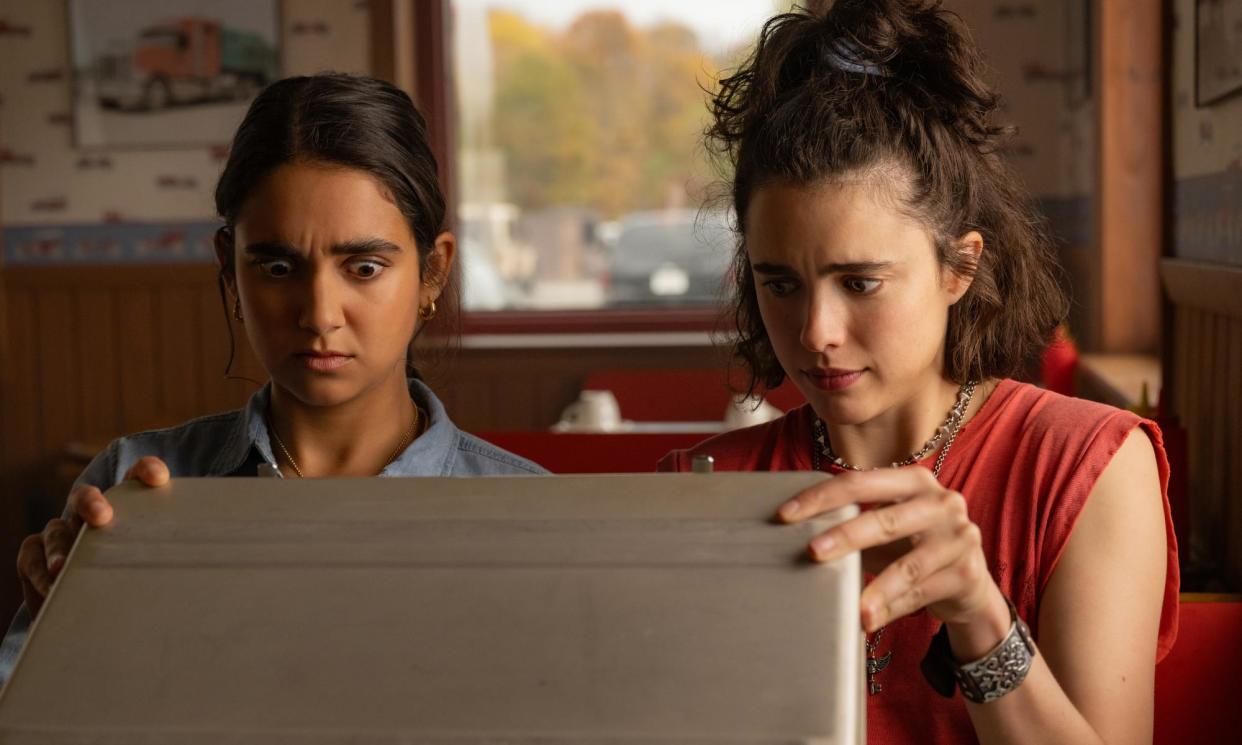Drive-Away Dolls review – Ethan Coen sets off in a wild new direction

During their time as a film-making team, Joel and Ethan Coen developed a reputation for uncanny synchronization, said by their collaborators to always give the same answer to any question even if asked separately. The brothers came to be called “the two-headed director”, but their respective features apart suggest a surgical detachment less than a single brain split in twain.
Related: Players review – Netflix’s Valentine’s romcom is a genre upgrade
A study in contrasts, the works produced during their brief hiatus – they’re rumored to already be back together, hard at work on their first foray into the horror genre – have given the impression of a single sensibility divided up evenly between them. Joel’s austere, atmospheric take on Macbeth ridded itself of all levity along with its color, and now, Ethan’s road comedy Drive-Away Dolls barrels into their shared oeuvre as its goofiest, loosest entry. Joel’s solo project mined the history of American experimental theater for a bold, charcoal-sketched revision of the Bard’s canon; Ethan’s sexploitation send-up revolves around a handful of pilfered dildos.
Far from the result of a trade-off between discipline and personality, however, this bawdy Sapphic joyride is also far from minor Coen miscellanea. It might seem like Ethan (along with wife and longtime editor turned co-writer Tricia Cooke, whose queer identity puts more of her skin in this particular game and complicates questions of authorship) has marshaled the usual plot devices toward broader, more sophomoric ends. We have an errant briefcase nicked from No Country for Old Men, a pair of hitmen – following Fargo’s chatterbox/misanthrope pairing – hot on its trail, and a loquacious wiseacre in the mold of O Brother, Where Art Thou’s Ulysses Everett McGill one step ahead of them on the lam. As incorrigible horndog Jamie (Margaret Qualley, her accent like Tommy Lee Jones speaking at 1.5x speed) and buttoned-up Marian (Geraldine Viswanathan in the straight-man role, so to speak) blaze a path to Florida in a rented car with some unexpected precious cargo, they take a route dotted with recognizable narrative landmarks.
But just as the Gulf war period piece The Big Lebowski ferreted away some bruising jabs at American political pathologies in offhanded remarks about Saddam and Bush Sr, Drive-Away Dolls situates its libido-drunk wild goose chase on the eve of Y2K, the twilight of Clintonism and the eve of a conservative resurgence. It’s fresh territory for the Coenverse to annex, as novel as a sense of humor dumbed-down enough to allow for a sight gag involving a tiny, humping dog. And in the most intriguing new variable of all to this auteurist formula, there’s a surprising openness of sentiment, offering the sweetest love story in a filmography constantly, erroneously charged with a self-satisfied ironic remove from its own characters. Jamie’s out here looking for a good time, and the film giddily obliges her without assuaging her suspicion that there might be a little more to life.
The archness of technique that’s turned off a vocal faction of detractors has been dialed way back, the allusive streak more incidental than insistent. Jamie mentions having seen a movie like this while re-enacting the notorious glowing-briefcase shot from Kiss Me Deadly, but this is mostly a matter of vibes; Coen and Cooke have admitted that they drew influence from their own half-formed notions of sleaze champions like Doris Wishman and Russ Meyer rather than their actual work. (The real key reference may be Dr Strangelove, which first posited the theory that war, government and the ideologies behind them all stem from the sexual neuroses of resentful, insecure men.) The essence of the Coenesque comes through strongest in the pristine dialogue, with its baroque turns of phrase, absurd circular repetitions, and idle philosophical musings. It’s just that this time around, the trademark colorful verbiage has been applied predominantly to euphemisms for getting off.
Whatever liberation comes with this shedding of seriousness also has its costs, most noticeably in the directorial rigor a notch or two below the standard. Perhaps the preternatural ability to place the camera in the funniest, cleverest spot belongs to Joel, though a tender moment spent lingering on the light from a swimming pool playing on the wall posits a more emotional, associative visual language. The characters want to get their rocks off, and the Coen-Cooke braintrust likewise get their stylistic kicks, indulging in wipe-style scene transitions so cheesy that a viewer’s reaction to the first one determines whether they will come along for the trip or get left behind. Interspersed passages of hazy psychedelia padding a svelte 84-minute runtime (featuring none other than Miley Cyrus, graciously undeterred by a lack of lines, as radical visual artist Cynthia Plaster-Caster, to whom the film is dedicated) take tripping literally, and risk comparison to the bumpers from That 70s Show.
“After 30 years, not that it’s no fun, but it’s more of a job than it had been,” Ethan Coen presumably sighed in a 2022 interview. A wild detour chock-a-block with wild detours, Drive-Away Dolls comes from an artist regaining his capacity to take pleasure in the process, no matter if that means slackening the laser-focused perfectionist streak evident even in his earlier comedies. Contrary to its easygoing casual gait, this is an essential work in the Coen corpus, an evolution more than a regression or sacrifice. It’s the rare case in which a preponderance of dick jokes heralds a newfound advance in maturity.
Drive-Away Dolls is out in US cinemas on 23 February and in the UK on 15 March

 Yahoo Movies
Yahoo Movies 
